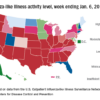Brief preoperative score predicts postoperative complications in the elderly
Background: Elective operations have become increasingly more common in the elderly. This population is at a higher risk for postsurgical complications. Previous research into preoperative risk assessment relied on geriatricians, of whom there is a national shortage.
Study design: Prospective cohort study.
Setting: Preoperative surgery clinics at the University of Michigan Health System.
Synopsis: A total of 736 elderly patients had a preoperative Vulnerable Elders Surgical Pathways and Outcomes Assessment (VESPA) administered by a surgical physician assistant in clinic. VESPA assessed activities of daily living, history of falling or gait impairment, and depressive symptoms. Patients underwent a Mini-Cog examination and a Timed Up and Go assessment. Patients were asked whether they expected they could manage themselves alone after discharge. One in seven patients reported difficulty with one or more of the activities of daily living and one in three stated they would be unable to manage postoperative self-care alone. Overall, 25.3% of patients had geriatric or surgical complications. The VESPA score predicted postoperative complications (area under the curve, 0.76). More specifically, preexisting difficulties with activities of daily living, anticipated self-care difficulty, a Charlson Comorbidity score of 2 or greater, male sex, or higher surgical relative value units were all independently associated with postoperative complications.
Bottom line: Elderly patients at an increased risk of postoperative complications can be identified by nonphysician staff using the VESPA preoperative assessment.
Citation: Min L et al. Estimating risk of postsurgical general and geriatric complications using the VESPA preoperative tool. JAMA Surg. 2017 Aug 2. doi: 10.1001/jamasurg.2017.2635.
Dr. Hoegh is a hospitalist at the University of Colorado School of Medicine.




